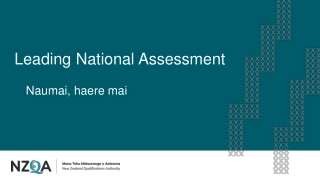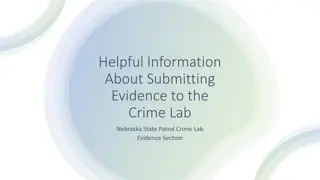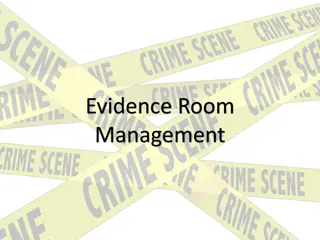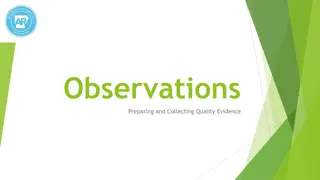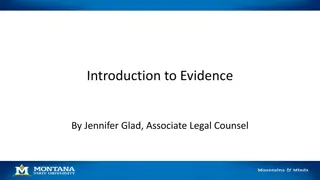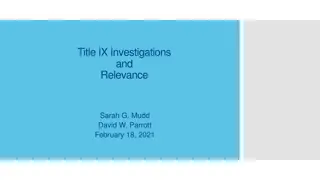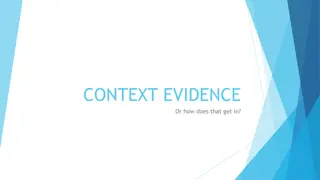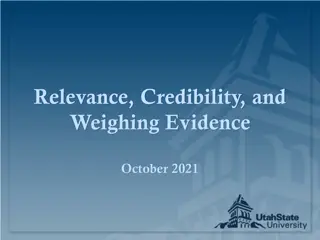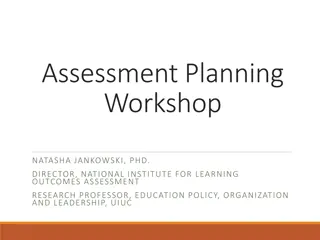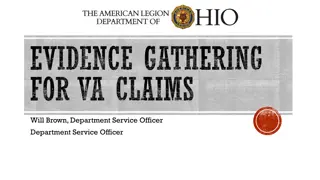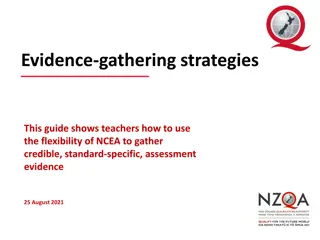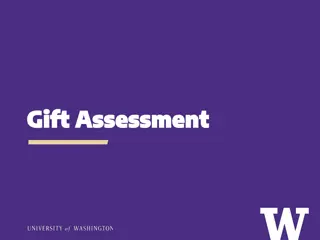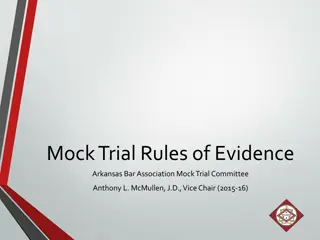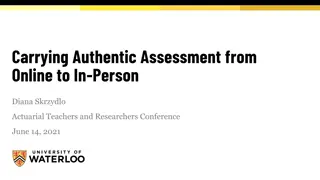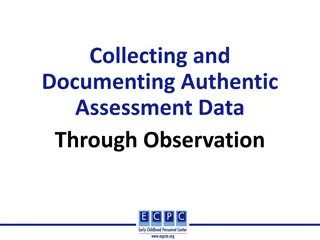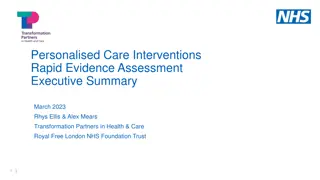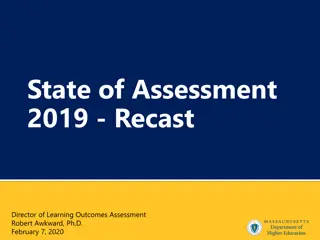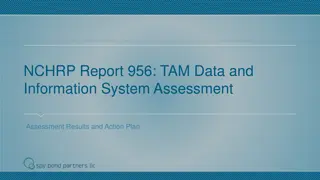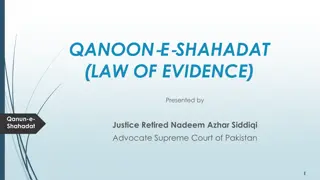Leading National Assessment
Today's mahi involves preparing for the upcoming NCEA Change implementation in 2024. The seminar program covers NCEA Changes, Policies, Readiness planning, Quality Assurance, Corequisites Updates, Pilots & Digital External Assessments. New NZQA Assessment Rules have been published, setting the code
1 views • 37 slides
The Role of Artifacts and Evidence in Educator Evaluation and Support
Exploring the role of artifacts and evidence in educator evaluation, this content covers the three categories of evidence required by the Oregon Framework. It delves into the efficient process that reduces redundancy, essential components of SLG goals, and the types of evidence relevant to professio
0 views • 15 slides
Understanding Impression Evidence Collection in CSI Investigations
Impression evidence plays a crucial role in investigations, including shoeprints, tool marks, tire tracks, bite marks, and riffling marks on bullets. This evidence can be collected in 2D using photography or tape lifts, and in 3D through casting methods. Differentiating between class and individual
0 views • 21 slides
Sheffield Early Help Assessment Form Update and Integration with Extended Support Plan
Sheffield has introduced an updated Early Help Assessment form to streamline the assessment process within the Early Help System. This new form combines the Early Help Assessment with the Extended Support Plan, aligning various assessment tools and referral forms into one comprehensive document. The
5 views • 22 slides
Helpful Information About Submitting Evidence to the Crime Lab.
Helpful information about submitting evidence to the Nebraska State Patrol Crime Lab's Evidence Section. Learn about the NSP 750 Evidence Submittal Form, submission process, and guidelines for resubmissions. Ensure all necessary details are provided for proper analysis of evidence.
5 views • 16 slides
Illegally obtained evidence
Illegally obtained evidence refers to evidence acquired through unlawful means, such as searches without warrants or extraction under duress. The Fruit of the Poisonous Tree doctrine renders evidence inadmissible if derived from illegally obtained evidence. The Exclusionary Rule prohibits the use of
2 views • 30 slides
Enhancing Language Learning Through Peer Assessment
Explore the benefits of peer assessment as a valuable tool for language learning, comparing it with self-assessment. Discover the components and challenges of self-assessment, along with the potential of peer assessment to improve accuracy and promote self-regulation. Gain insights into what peer as
3 views • 29 slides
Evidence Room Management
Explore the intricacies of evidence room management in a law enforcement setting, including the roles of individuals like Greg Van Buskirk, differences in crime scene management between large and small departments, the distinction between property and evidence, the importance of maintaining chain of
0 views • 8 slides
Overview of DSW End Point Assessment Team Leader Level 3
DSW End Point Assessment Team Leader Level 3 provides a clear understanding of the assessment process, ensuring individuals comprehend why and when it occurs, responsibilities involved, and how DSW supports them. It covers topics such as what End Point Assessment entails, assessment design and deliv
1 views • 18 slides
Enhancing Evidence Collection in Education
Explore the importance of minimizing bias in evidence collection, review different types of evidence, identify strategies to collect quality evidence effectively, understand common biases affecting assessment, and learn to spot and address biased statements. Practice eliminating biased language and
0 views • 11 slides
Understanding Evidence in Investigations
Learn about the principles and types of evidence in investigations, including inculpatory and exculpatory evidence, physical, documentary, demonstrative, and verbal evidence. Explore sources of evidence and the significance of collecting relevant information to ensure a fair investigative process.
0 views • 14 slides
Understanding Title IX Investigations and the Role of Evidence Collection
The purpose of a Title IX investigation is to collect relevant evidence, both inculpatory and exculpatory, to allow for impartial decision-making regarding reported sexual harassment cases. Parties involved must receive sufficient notice and have opportunities to participate, present statements, and
1 views • 32 slides
Understanding Context Evidence in Legal Proceedings
Context evidence in legal proceedings refers to evidence of acts not charged in the indictment, used to provide a background for understanding specific allegations. This type of evidence is often relied upon by the prosecution to explain events or behaviors that may seem isolated or surprising. It i
1 views • 13 slides
Understanding Assessment in Medical Education
Exploring the concepts of assessment in medical education, including defining assessment, types of assessment, reliability, validity, and aligning assessment methods with intended learning outcomes. The importance of constructive alignment and the impact of assessment on learning outcomes are also d
1 views • 12 slides
Understanding Evidence-Based Medicine and Clinical Decision-Making
European Patients Academy on Therapeutic Innovation emphasizes the importance of Evidence-Based Medicine (EBM) in providing optimum clinical care. EBM involves systematic review and utilization of clinical research for informed decision-making, benefiting patients in disease management and treatment
7 views • 20 slides
Assessment Matters in Sociology: Enhancing Learning Through Evaluation
Explore the significance of assessment in sociology education, focusing on key questions to evaluate current assessment procedures, review individual course assessments, and develop strategies to enhance student learning outcomes. Delve into the centrality of assessment in the learning process, with
1 views • 15 slides
Understanding Relevance, Credibility, and Weighing Evidence in Decision-Making
Explore the importance of relevance and credibility in evidence assessment, the role of hearing panels in evaluating evidence fairly, and the responsibilities they hold. Learn about presenting relevant evidence, policy analysis, and identifying irrelevant evidence to ensure a thorough review process
6 views • 32 slides
Insights into Managing Assessment in the Classroom by Assessment Research Group
Explore the importance of standards and assessment in education through the lens of the Assessment Research Group. Gain valuable perspectives on curriculum delivery, understanding the assessment system, learner assumptions, task parameters, and more. Discover how language, structure, and agency play
2 views • 25 slides
Workshop on Assessment Planning by Dr. Natasha Jankowski
Dr. Natasha Jankowski, Director of the National Institute for Learning Outcomes Assessment, conducts a workshop focusing on effective use of assessment data to enhance undergraduate education. The workshop covers areas like evaluating assessment plans, program learning outcomes, and assessment rubri
0 views • 30 slides
Enhancing Understanding through Assessment in Educational Design Workshop
Learn and collaborate on assessment practices in education design at the "Understanding by Design Assessment Focus" workshop. The agenda includes sessions on summative and formative assessment, feedback, reporting, and more. Engage in activities like generating questions, finding destination partner
1 views • 76 slides
Mastering Claims, Evidence, and Warrants for Persuasive Writing
Understanding the concepts of claims, evidence, and warrants is crucial for constructing persuasive arguments. Claims represent positions to persuade, evidence supports claims with facts, and warrants bridge the gap between evidence and claims. An exercise is outlined to help practice forming claims
0 views • 8 slides
Understanding Biased Assimilation and Attitude Polarization in Social Disputes
People with strong opinions on complex social issues tend to interpret evidence in a biased manner, accepting confirming evidence readily while subjecting disconfirming evidence to critical evaluation. This can lead to increased polarization rather than narrowing of disagreement when exposed to the
0 views • 20 slides
Institutional Assessment Planning Workshop Feedback and Insights
Feedback and insights from a recent institutional assessment planning workshop led by Dr. Mark Nicholas at FSU S. Warren Conference Center & Inn. Participants provided feedback on the usefulness of the content, presenter knowledge, ability to develop assessment plans, post-training assessment knowle
1 views • 9 slides
Transformation of Quality Assessment Framework in Healthcare
The healthcare quality assessment framework is evolving with a new strategy focused on data-led, people's experiences, care integration, and safety culture. The current framework is transitioning towards a new approach by late 2023, incorporating separate registration and monitoring processes, five
0 views • 14 slides
Understanding Higher Education Assessment: The Complete Guide
Higher education assessment involves a systematic process of collecting, reviewing, and utilizing information to improve student learning and development. This guide covers the assessment cycle, learning outcomes, the mission behind assessment in higher education, what assessment is and is not, reas
1 views • 36 slides
Understanding Evidence Gathering for VA Claims with The American Legion Department of Ohio
Evidence is crucial for VA claims, and it can come in various forms such as documents, written statements, photos, and video recordings. The framework for evaluating evidence includes factors like relevance, competence, credibility, and weight. Understanding the types of evidence, forms of relevance
0 views • 14 slides
NCEA Evidence-Gathering Strategies for Teachers
This guide explains how teachers can use the flexibility of NCEA to gather credible assessment evidence, tailored to meet student needs. It emphasizes the importance of integrating assessment with learning, producing valid evidence, and ensuring fairness and transparency in assessment practices. Tea
0 views • 19 slides
Understanding Gift Assessment Process at University of Washington
The Gift Assessment Process at University of Washington involves applying a 5% assessment to select current-use gifts over $1,000 and under $5 million. This assessment supports the university's advancement efforts and institutional priorities by transferring 5% of eligible contributions to the Provo
1 views • 5 slides
Understanding Mock Trial Rules of Evidence
Mock Trial Rules of Evidence are crucial for determining the admissibility of testimony and evidence in a trial setting. Students preparing for cases need to assess evidence admissibility, make timely objections, and be prepared to defend testimony. The rules cover objections, specific objections ty
0 views • 36 slides
Overview of Environmental Impact Assessment and Strategic Environmental Assessment Directives
Environmental Impact Assessment (EIA) and Strategic Environmental Assessment (SEA) play crucial roles in evaluating the impact of planned activities on the environment. This content delves into the concept, origins, development, and key elements of environmental assessment, discussing the legal fram
2 views • 35 slides
Institutional Assessment and Effectiveness Workshop Achievements at SUNY Oneonta
The Office of Institutional Assessment and Effectiveness at SUNY Oneonta has made significant progress in developing assessment protocols and processes, leading to a culture of assessment. This includes completing planning and assessment cycles, establishing objectives and procedures, and aligning u
1 views • 16 slides
Oregon Department of Education Assessment and Accountability Resources
Access important information on assessments, accountability, and reporting from the Oregon Department of Education. Find resources on updating assessment records, accessing student scores, and staying informed about assessment requirements for the 2023-24 academic year. Explore links for assessment
0 views • 55 slides
Oregon Department of Education - Assessment Resources and Updates
Explore the Assessment Record Updating Application (ARUA), Accountability Warehouse Extract (AWE), Secure Assessment Reports, and other important tools and information provided by the Oregon Department of Education for assessment data owners, analysts, and partners. Access links for assessment admin
0 views • 54 slides
Practice and Procedure in Judicial Review: Factual Evidence and Interveners
The content provides valuable insights into the practice and procedure regarding factual evidence and interveners in judicial review cases. It covers general rules, recent cases, applications for oral evidence, questioning witnesses, opinion evidence, and the role of interveners. Key points include
0 views • 28 slides
Enhancing Teaching Assessment for Actuarial Education
Exploring the transition of assessment practices from online to in-person settings, this presentation by Diana Skrzydlo at the Actuarial Teachers and Researchers Conference delves into the purpose of assessment, key principles, and activities for effective evaluation. Discover insights on diagnostic
0 views • 10 slides
Authentic Assessment through Systematic Observation: Best Practices
Explore the process of authentic assessment through systematic observation in early childhood education. Learn about collecting, documenting, and interpreting assessment data using evidence-based practices and technology. Discover the importance of working collaboratively with families and professio
0 views • 53 slides
Rapid Evidence Assessment on Personalised Care Interventions
Embedding personalised care into local health systems is a key aim, backed by a strong policy drive. A recent assessment by Transformation Partners in Health & Care at Royal Free London NHS Foundation Trust focused on key areas like Diabetes, MSK, and COPD. The study methodology involved a Rapid Evi
0 views • 12 slides
Assessment Practices in Higher Education Institutions
Dive into the state of assessment for the year 2019, featuring insights on hosting assessment days, establishment of assessment committees, implementation of institutional and program learning outcomes, appointment of a Director of Assessment, compensation for faculty members focusing on assessment,
0 views • 8 slides
NCHRP Report 956 TAM Data and Information System Assessment
This content provides an overview of NCHRP Report 956 focusing on the TAM data and information system assessment results and action plan. It includes details on assessment outcomes, recommendations, implementation action plans, and tools for self-assessment and improvement methodology. The content a
0 views • 21 slides
Understanding Qanun-e-Shahadat: Law of Evidence in Pakistan
Qanun-e-Shahadat Order 1984 replaced the Evidence Act of 1872 in Pakistan, aiming to align the law of evidence with Islamic principles. This law is crucial for judicial proceedings, governing the admissibility of oral and documentary evidence, primary and secondary evidence, and resolving conflicts
0 views • 22 slides
